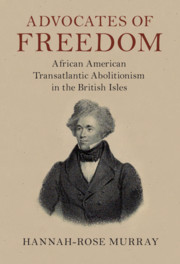Book contents
- Advocates of Freedom
- Slaveries since Emancipation
- Advocates of Freedom
- Copyright page
- Contents
- Figures
- Acknowledgments
- Dedication
- Introduction
- 1 “It Is Time for the Slaves to Speak”
- 2 “All the Bloody Paraphernalia of Slavery”
- 3 “[They Have] Not Ceased to Hold My Hand Since”
- 4 To “Frighten the Hyena Out of His Ferocity”
- 5 “I Would Much Rather Starve in England, a Free Woman, Than Be a Slave”
- 6 “Have No Fellowship I Pray You, with These Merciless Menstealers”
- 7 “My Name Is Not Tom”
- 8 “The Black People’s Side of the Story”
- Conclusion
- Bibliography
- Index
3 - “[They Have] Not Ceased to Hold My Hand Since”
Frederick Douglass, Print Culture, and Abolitionist Networks
Published online by Cambridge University Press: 07 September 2020
- Advocates of Freedom
- Slaveries since Emancipation
- Advocates of Freedom
- Copyright page
- Contents
- Figures
- Acknowledgments
- Dedication
- Introduction
- 1 “It Is Time for the Slaves to Speak”
- 2 “All the Bloody Paraphernalia of Slavery”
- 3 “[They Have] Not Ceased to Hold My Hand Since”
- 4 To “Frighten the Hyena Out of His Ferocity”
- 5 “I Would Much Rather Starve in England, a Free Woman, Than Be a Slave”
- 6 “Have No Fellowship I Pray You, with These Merciless Menstealers”
- 7 “My Name Is Not Tom”
- 8 “The Black People’s Side of the Story”
- Conclusion
- Bibliography
- Index
Summary
Chapter 3 focuses on Douglass’ relationship with abolitionist networks and print culture. He was a shrewd activist and formed friendships with newspaper editors, prominent citizens who had influence over the local press, and sometimes wrote for newspapers specifically to clarify his opinions or to cause further controversy, such as the Cambria in 1847. The constant exchange of letters and newspaper articles that reported on his speeches maintained essential momentum for the antislavery cause and enhanced a connected feeling of solidarity. This network did have its disadvantages however, as white abolitionists were not free from prejudice and Douglass – like other Black activists – struggled against a white racist schema that threatened to control Black bodies. However, Douglass left Britain more independent and determined to seek his antislavery career outside the realm of white control.
Keywords
- Type
- Chapter
- Information
- Advocates of FreedomAfrican American Transatlantic Abolitionism in the British Isles, pp. 123 - 162Publisher: Cambridge University PressPrint publication year: 2020

